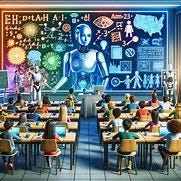What is Human Development within Hillside Ventures?
Human development as an investment thesis is all about putting people at the center. It’s the belief that when we invest in things like education, healthcare, and job training, we’re not just helping individuals, but we’re laying the groundwork for stronger communities and a healthier economy. Instead of only focusing on buildings, tech, or numbers, this approach sees human potential as the most valuable resource. When people have the tools and opportunities to grow, they become more innovative, more productive, and more capable of creating lasting change.
Rise in AI:
The rise in AI has been one of the most transformative shifts of our time, reshaping how we live, work, and interact with the world. From smart assistants and personalized recommendations to complex data analysis and automation, AI is becoming deeply embedded in our daily lives. It’s driving efficiency, unlocking new possibilities across industries, and changing the way businesses operate. At the same time, it’s creating important conversations about ethics, job displacement, and the need for responsible innovation. As AI continues to evolve, it holds the potential to solve some of the world’s biggest challenges, but only if we use it wisely for the benefit of society as a whole.
How AI Impacts the Education Industry:
The rise in AI is significantly transforming the education industry, making learning more personalized, accessible, and efficient. With tools like adaptive learning platforms, AI can tailor lessons to individual students’ needs, helping them grasp concepts at their own pace. Teachers are also benefiting, using AI to automate administrative tasks like grading or attendance, freeing up more time to focus on meaningful student interactions. Additionally, AI-powered tools can support students with learning differences and language barriers, creating more inclusive classrooms. While these advancements offer exciting opportunities, they also raise important questions threats that AI poses to traditional learning.
Negative Effects of AI in Education:
While AI brings many benefits to education, it also poses several challenges, especially in traditional learning environments. One major concern is the potential decline in critical thinking and problem-solving skills, as students may become overly reliant on AI tools for answers instead of engaging classroom course content. The increased use of AI can also reduce meaningful human interaction in the classroom, which is essential for social and emotional development for students. Additionally, students in under-resourced schools may not have equal access to advanced AI technologies, increasing existing inequalities. Over time, the growing presence of AI in education could shift the focus away from holistic learning and creativity, making education feel more transactional rather than using it to grow your overall intelligence.
Conclusion:
The rise of AI opens up incredible prospects to improve the way we live, learn, and work, bringing new levels of efficiency, personalization, and innovation. From transforming businesses to reshaping education, AI has the ability to solve difficult problems and improve quality of life on a global scale. However, these breakthroughs bring significant challenges such as ethical concerns, data privacy, employment displacement, and rising inequalities that we cannot afford to ignore. As we continue to innovate, it is critical that we handle AI development responsibly, holistically, and strategically. Balancing development and humanity will be critical to ensuring that AI acts as a tool for the greater good rather than a force that separates society


